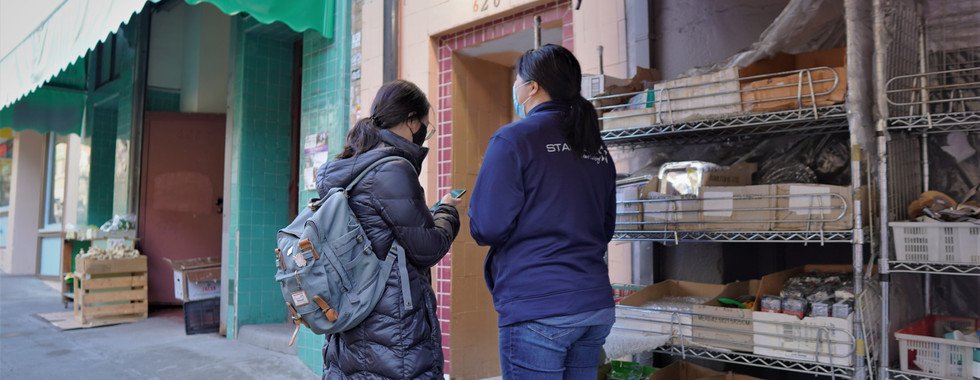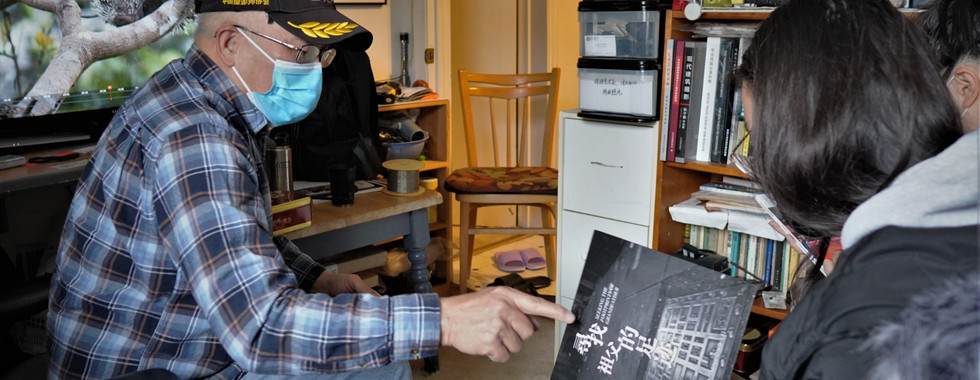10 Chinatown Artists Selected for Unprecedented Funding as part of Guaranteed Income Pilot
- Jun 29, 2022
- 6 min read
Updated: Aug 3, 2022

Studio visit in Baht Wor Foundation’s studio space in front of the Master Huaguang figure, the Patron deity of Cantonese Opera and the deity of fire
🤝Guaranteed Income Pilot
San Francisco Chinatown ignited the fight for Asian American ethnic studies in the 1970s, sparked national dialogue for housing and worker rights, and most importantly, has set the precedent for Chinese American and Asian American cultures. As such, Chinatown artists are essential agents of social change and that art-making is integral to cultural impact and shifts. However, in traditional funding pathways, there are clear barriers due to ineffective outreach, language & technology access, and understanding of current funding system, among other challenges. Moreover, due to the systemic racism and the model minority myth, Chinatown artists who are low-income, monolingual and facing other barriers are cut off from mainstream opportunities.
In 2021, Chinese Culture Center of San Francisco (CCC) partnered with the Yerba Buena Center for the Arts (YBCA)’s Guaranteed Income(GI) Pilot program as a part of a Creative Communities Coalition. YBCA’s Guaranteed Income cash relief pilot is designed specifically to support artists living and working in the City of San Francisco who have been disproportionately affected by the COVID-19 pandemic through providing monthly payments of $1,000 to 60 eligible San Francisco artists over a period of 18 months. CCC is proud to be in community with Black Freighter Press, Compton’s Transgender District, Dance Mission Theater, Galeria de la Raza, and SF Bay Area Theater Company to advocate for more equity and solidarity in the funds distribution process.
Led by CCC's Community Arts Program Director Vida Kuang and Engagement and Evaluation Analyst Jiatian Wu, alongside Community Artist Advisor & longtime Chinatown reporter David Huang, CCC introduced an unprecedented process to inspire a more empathetic and grassroots model for funding distribution. Resulting from a rigorous 10-month process, CCC is proud to celebrate and highlight 10 phenomenal artists from San Francisco’s Chinatown who are recipients to this guaranteed income community pilot. In this blog, we will share our process and how this infrastructural support can impact the artists and their communities.
💖Our Process: Introducing a Grassroots Approach
Reflections by Vida Kuang, CCC Community Arts Program Director
With the way current funding works, artists need to jump through multiple hoops to justify why their livelihood needs to be sustained. We wanted to create a process that is rooted in listening, empathy, and at a grassroots level.
Together, JT (Jiatian) and I met with photographer David Huang to identify gaps where community-based artists are not given the chance to participate in funding application — particularly for non-English speaking, low-income immigrant artists due to either language barriers, tech barriers, and or how inaccessible funding application processes are generally. We didn’t want to re-create these barriers. We wanted to witness artists’ full selves along with their art and give them a chance to hear why we are doing this work.
We visited our artists in in-laws, SROs, culture centers, senior housing, theater associations, at their side hustles, etc. We saw for ourselves the level of mastery our artists had, their dedication, their struggles, their dreams.
Our conversations were bi-lingual in Chinese and English with interpretations from both JT and myself. We got to see how a festival artist stores her performance gear above her bed in her SRO, how a photographer transformed the standards of photography exhibition in Chinatown, how an opera group continues to uplift the art of Cantonese opera yet doesn’t have funding to fix their roof, how a young arts educator encourages her Chinatown youth to experiment with different art medium, and how a young filmmaker documents Chinatown family association history and their funeral practices. All these artists make the fabric of our community’s stories and in turn continue to add to our community’s vibrancy and health.
Artist visits documentation by photographer & collaborator David Huang
"During the selection process, the CCC treated every candidate with respect and honesty. The final cohort was distinguished and diverse, featuring artists from different disciplines, age groups, and cultural backgrounds. I believe this program will enable a wider audience to meet Asian grassroots artists. At the same time, these artists bring positive change and impact to mainstream American culture.
As a longtime reporter for the Chinatown community, I worked closely to document grassroots Chinese artists in the Bay Area, as a photojournalist to document their life and work. Through this experience, I was able to deeply understand each artist’s passion for their creative practice. This is the first time such a program has been implemented in Chinatown. While the number of participants is limited due to finite resources, I hope there will be many more opportunities like this in future for artists to unleash their creativity, enrich our neighborhood's culture, and serve the community.”
“中華文化中心在甄選過程中,秉承專業與真誠對待每位候選人,選出的獲獎者有代表性,覆蓋不同藝術種類、年齡、文化背景等,相信這次活動,幫助主流社會認識亞太裔草根藝術家,讓他們進入主流社會起到積極的作用。
我作為一名在社區工作多年的媒體工作者,與這些藝術家群體保持密切的聯繫,用鏡頭與文字記錄了他們的工作與生活經歷,了解到他們的藝術創作熱情。這是在華埠第一次舉辦資助草根藝術家的計劃,可惜名額有限。期待今後能有類似的機會,鼓勵更多藝術家繼續發揮他們的創作熱情,豐富社區文化,服務社區。 ”
--- Reflections by David 黃偉江, Community Advisor & Longtime Chinatown Reporter
💪Let's Meet the Artists!
Through the Pilot, CCC is proud to have selected ten artists who actively shape narratives about the Chinatown that centers community members who live and work here. They are phenomenal photographers, painters, arts educators, filmmakers, illustrators, and Cantonese opera performers. They represent Chinatown’s excellence–one that is intergenerational, cross-cultural, and multi-ethnic.
Of the artists the CCC has enrolled into the guaranteed income community pilot:
-6 identify as women, 4 identify as men
-8 are currently on a form of city or state-level aid program
-4 are over age 65
-1 is a traditional performance artist
-5 are immigrant monolingual speaking artists
-2 are queer-identifying
Jeanette Lazam, Illustrator / Painter / Writer

Jeanette Lazam interviewed by Jiatian Wu, CCC's Engagement & Evaluation Analyst
Jeanette Lazam is a Gay, American Filipino, disabled artist, elder. Lazam was born and raised on the Lower East Side of Manhattan in the Jacob Riis Public Housing. When Lazam moved to SF in the 60s, she resided in what was then the last site of the historic Manilatown International Hotel. She was one of the original tenants of I-Hotel. On the night of August 4th, 1977, police forcibly evicted her and other poor and elderly Filipino and Chinese tenants. She was involved with Filipino cultural groups in CCSF and has been illustrating all her life. During the pandemic, she moved back to the I-Hotel. Recently at the Manilatown Heritage Foundation, she exhibited “A Celebration of Mirth, Myth, and Mythology,” a series of illustrations themed on gods and goddesses from different cultures inherited through oral tradition and suppressed by European colonization. "Manilatown Manang" is a documentary on her life and times as a lifelong human rights activist and defendant of the I-Hotel tenants.
Kylie Panday, Arts Educator at Cameron House
Based in San Francisco, Kylie Panday is an emerging artist and young educator at the Cameron House who guides youth with her knowledge of calligraphy, painting, henna, and music. Her passion inspires and encourages her students to infuse artmaking into everyday life. Art as a medium for social healing and art as activism are central pillars in her creative practice. Recently, Panday has worked on a mural in Oakland for the Black Lives Matter movement. Through Cameron House, she is committed to sharing and passing on the legacy of Chinatown culture.
Kar Yin Tham, Filmmaker
Trailer of Kar Yin's film, "Home is a Hotel"
Kar Yin Tham is an independent filmmaker based in San Francisco. Narrative projects she has helped produced, Adrift in Sunset, and Collisions have won best film awards and screened at festivals across the country and internationally. Kar Yin is currently producing and co-directing a documentary, Home is a Hotel, featuring residents' resilience and exposing housing inequality in San Francisco.
Zushun Lei 雷祖舜, Cartoonist

Zushun Lei showing his cartoon series.
Zushun Lei is an 88-year-old Chinatown association(公所)resident and artist hailing from Toisan, China. He is a lifelong cartoonist focused on discovering whimsical moments and humor in daily Chinatown life. During his time in China, he created weekly paintings for the Shanghai Art Commission. He continued to do commissioned pieces for the Wind Newspaper after arriving in America, specifically editorial cartoons. In the past decade, he published a comic collection「笑一笑」 (literal translation “Laughter”) that features 30 years of his previous works in China. In recent years during the COVID-19 pandemic, his work focused on satirizing the Trump administration’s language against the Chinese community. He plans on publishing「再一笑」(literal translation “Laugh Once More”—the sequel to his previous—book this year.
Xiaoyun Zhou 周笑雲, Dancer

Xiaoyun in her SRO home.
Xiaoyun Zhou is a dancer in her seventies and she leads the Portsmouth Square Dance Club which consists of around 50 members. Zhou immigrated from Kaiping, China to America in 2003. She loves dancing since she was a little girl. She lives in SRO in Chinatown which couldn’t support her with enough space to dance after work. Zhou notices that Portsmouth Square is always quiet from 7-8 am, she wants to bring music and dance to Portsmouth Square to make it become more welcoming. She self-taught how to dance through videos and teaches other dance members to dance. Zhou’s dance brings vibrancy, love and care to the community.
Minxiong Li 李敏雄, Photographer

Minxiong Li showing his negatives from his photos of Chinatown.
Now in his seventies, Minxiong Li is a photographer who documents historical moments in the Chinese American community. Though he only immigrated to America in 2006, his great grandfather was a railroad worker in Utah. He never had the chance to meet him. Through the lens of his camera, he traces the footsteps of his great grandfather’s life and attempts to create a connection that transcends time and space.
On May 8th, 2021, Li exhibited his works in「華埠日記」 "Chinatown Diary," a personal photography show that documents Chinatown during the COVID-19 pandemic. More recently, he launched an exhibition called 「群星閃耀照華埠」(literal translation “All Stars Shine on Chinatown”).
Yuchuan Pan 潘育川, Photographer
Pan is a Bay Area photographer and an ink wash artist that intends on using his work to bring warmth and optimism to the community during these turbulent times of strife, disappointment, and shared melancholy. He graduated from Guangzhou Academy of Fine Arts with a Bachelor of Arts degree in 1988. He is currently a member of the Guangdong Artists Association, standing director of Guangdong Young Artists Association, and director of Guangzhou Artists Association. In addition, Pan holds multiple positions in the art community in the United States, including vice president of the American Contemporary Asian Art Association, director of the San Francisco Chinese Art Association, and Vice President of the Silicon Valley International Artists Association. Pan has held more than ten solo exhibitions and more than 30 group exhibitions in China, France, the United States, Italy, and other countries.
Joyce Xi 郗雨姗, Photographer
Joyce Xi (she/her) is a community photographer based in the Bay Area/occupied Ohlone territory. She is a daughter of Chinese immigrants, grew up on the east coast, and has lived in the Bay Area for most of her adult life. Her work documents experiences and activism of Chinese and Asian American communities locally, as well as social movements and solidarity building more broadly. She tries to practice photography that is relational and in connection with the people, communities, and movements she photographs with, rather than from an outward and disconnected gaze. Her work is also informed by her own activism and experiences with racism and systemic violence in the US. She hopes her photography can be a means to envision and contribute to a more just future, and portray our communities with nuance, complexity, and care.
Website: https://www.joycexiphotography.com/
Instagram: @joycexiphotography
Baht Wor Charity Foundation 美西八和會館, Cantonese Opera Foundation

Photos and ephemera collection from Baht Wor Foundation reflecting the Cantonese opera history in Chinatown
Baht Wor Foundation was established in 1957, is the one and only public non-profit Cantonese Opera Foundation in Chinatown. Baht Wor has a history of supporting and sheltering immigrant opera artists, giving them resources and opportunities to survive a discriminatory. While other institutions excluded the disadvantaged, Baht Wor broke the financial barrier of learning and participating in this traditionally elite performance art form. A space was created to welcome these artists and build community—a place of belonging.
In addition, Baht Wor is a museum that preserves a number of opera antiques like posters, musical instruments, and opera costumes that have over a century of history.
💡What We Learned: Lessons For Equity
Reflections by Jiatian Wu, CCC Engagement & Evaluations Analyst
I noticed that most of the artists from our community do not have additional resources to fund their arts practice. There are clear barriers due to ineffective outreach, language and technology access, and understanding the current funding system, among others. From our in-person artist visits, Chinatown artists shared that by getting short-term income to ease their current financial burden, they will lose their safety net programs (like: Medi-Cal, Calfresh, Supplemental Security Income, Calworks, etc.). Artists need to choose between losing their eligibility for safety net programs that sustain their livelihood or turning down commissioned work opportunities.
As a result, low-income artists become trapped in a long-term economic struggle.
This is called a “Benefits Cliff”
“Safety net programs are effective in reducing poverty, especially deep poverty, and many benefit recipients rely on these programs to survive. However, the majority of these programs have restrictive, complex, and shifting eligibility requirements around household income and assets. People relying on benefits face a well-documented “benefits cliff” problem, where even small increases in earnings or assets can result in sudden and often unexpected reductions, or even total losses, in public benefits. The benefits cliff penalizes families for making more money or saving, and actively prevents people from achieving economic security.” Protecting Benefits in Guaranteed Income Pilots Abundant Birth Project, November 2021
Artists from our communities need sustainable support that can also be compatible with general safety net programs. We hope from the Guaranteed Income pilot, we can showcase a model that can be supportive for artists that are facing everyday dilemmas. As a sustained and no-strings-attached model, this type of funding has the potential to help artists rebuild their economic security, while recognizing their artistic labor and impact on Chinatown.
📰Press Coverage
Acknowledgement








































































